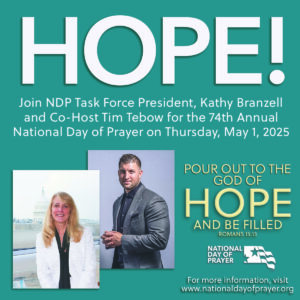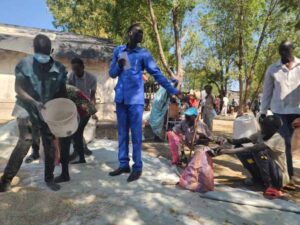
WASHINGTON (BP)–If political pundits are having a difficult time discerning the mind of the American voter after the Nov. 3 election, the results of ballot initiatives across the country provide a clear indication of voters’ thoughts on several bellwether social issues.
Voters in Alaska, Nevada, Oregon and Washington signaled their approval of the medical use of marijuana. Arizona voters agreed with their West Coast neighbors, repeating their 1996 vote to legalize a measure allowing physicians to prescribe marijuana. The vote overturns the state’s legislature request to delay legalization until the federal government approves the drug for medical use.
In results bound to cheer right-to-life proponents, Michigan voters rejected a ballot measure that would have allowed physician-assisted suicide while also re-electing Gov. John Engler over challenger Geoffrey Fieger, an attorney who represents assisted-suicide doctor Jack Kevorkian.
Colorado voters approved a measure requiring parental consent for minors receiving an abortion, but joined Washington State citizens in refusing to criminalize the medical procedure known as partial-birth abortion.
A measure to expand casino gambling on Indian reservations was given the nod by Californians. The victory culminated a pitched battle — the costliest ballot initiative campaign in U.S. history — between several Indian tribes and Las Vegas casino owners seeking to maintain their hold on the area’s gaming market.
Passage of the ballot measure titled “boats in moats” in Missouri frustrated anti-gambling groups, already stung by the infusion of gaming industry money into the gubernatorial races in South Carolina and Alabama that saw lottery proponents unseat social conservatives’ favorites in the two Southern state governorships.
In Missouri, voters amended their constitution to legalize slot machines on casinos that float in artificial moats, handily passing a “boats in moats” gambling proposal. Missouri voters had already approved riverboat gambling in 1992, but gambling foes said the “boats in moats” — or 10 of the state’s 16 casinos — did not qualify. Ultimately, “boats in moats” was put on the ballot following a Missouri Supreme Court decision that said the legislature overstepped its authority when it permitted casinos in artificial basins up to 1,000 feet from the Mississippi and Missouri rivers’ channels.
“We’re seeing, even in states where there are is a strong Christian presence, that there are many who don’t see anything wrong with it,” said Mike Hamlet, pastor of the First Baptist Church of North Spartanburg and president of the SBC’s Pastors’ Conference. “It’s a reflection of a society that says, ‘Give it to me today, I don’t care about tomorrow or what it does to anyone else.’ It is also a reflection of our culture where we seem to be rejecting any type of moral standard.”
In apparent affirmation of a traditional moral standard, Hawaii and Alaska passed measures banning same-sex marriages by a 2-1 margin.
“That’s right on the button with the national polls,” said Richard Land, president of the Southern Baptist Ethics & Religious Liberty Commission. “Americans are overwhelmingly opposed to the legalization of homosexual and lesbian marriages.”
A measure to provide homosexuals legal protection from discrimination in housing, employment and public accommodations was defeated by voters in Fort Collins, Colo. The measure took on special interest after homosexual University of Wyoming student Matthew Shepard died in a local hospital last month after a vicious beating across the state line in Wyoming. Voters in South Portland, Maine, approved a similar measure.
Voters in five western states gave decisive nods to measures legalizing marijuana use for pain relief. Nevada voters will have to revisit the issue in the year 2000, since the amendment on medical marijuana requires two “yes” votes for ratification.
This may be about as far at the state level that marijuana advocates will be able to push their agenda, said Barrett Duke, spokesman on the issue for the Ethics & Religious Liberty Commission. “But with all these medical marijuana issues passing on the state level, we can expect to see the use of marijuana for medicinal purposes debated more vigorously on the national level,” Duke said. Prophetic words indeed, as USA Today reported Nov. 3 the Justice Department is considering permitting government-supervised use of marijuana as a treatment for sick people. Agreeing to this as settlement of a 160-person, Philadelphia-based lawsuit would be a major reversal of Justice Department policy.
Still, the election-day question remains, Why did the people in five states agree to permit the medical use of marijuana?
“At the debate in our church, several members thought if it really would help those who are critically ill, they couldn’t see any danger,” said Earl Morley, pastor at First Baptist Church, Sparks, Nev.
The “compassion” vote was one angle medical marijuana legalization advocates were pushing, Duke said.
“People are being convinced the medical use of marijuana is an individual choice,” he continued. “Many people are willing to let a lot of folks do what they wouldn’t do themselves. They’re just following their general inclination not to impose their own moral values on other people unless they feel that in some way their own well-being or livelihood would be affected.”
In Michigan, spokespersons for organizations that helped defeat an attempt to legalize assisted suicide there credit broad-based coalitions for the victory.
“Overall, the church was involved and saw this as a threat to their values,” said Mark Blocher of Baptists for Life, a national organization based in Grand Rapids, Mich. “We sent out thousands of brochures and were pretty active in the campaign.”
The Baptists were one of more than 30 religious, civic and medical organizations leading the fight against assisted suicide. The groups organized under the banner of Citizens for Compassion Care.
Although it will disband, the group is urging its members to become involved in two other, hospice-related organizations.
Attempts to outlaw partial-birth abortion in two western states were turned back by voters. But Christian groups are hailing the passage of a Colorado initiative requiring parental notification before a girl under 18 can have an abortion.
“This is nothing to sneeze at,” said Carrie Gordon, bioethics analyst for Focus on the Family, based in Colorado Springs. “Colorado was one of the first states to legalize abortion before Roe v. Wade. To ratify parental notification is a significant win and it should stand up in court.”
Mary Spaulding Balch, director of the department of state legislation for Right to Life’s Washington, D.C., office, also hailed the law’s passage.
That coupled with the close loss for the partial-birth ban demonstrate that the organization’s message is penetrating the public’s consciousness, Balch said, noting the adoption of parental notification indicates Americans are not as radical on abortion as pro-choice proponents contend.
The partial-birth abortion ban in Colorado failed by a slim margin. It was the same result but a larger loss in Washington, where a similar measure went down to a resounding defeat. The Seattle Times reported the referendum trailing by a 57-43 percent gap at press time.
Larry Stickney, campaign manager for the Committee to Stop Infanticide, said the measure was swamped by intense media opposition and a Democratic takeover of the statehouse and state senate. In addition, the group supporting the ballot initiative raised nearly $1 million — including a $400,000 donation from Planned Parenthood — compared to just $180,000 for proponents, Stickney said.
“Maybe we’re entering a new day in Washington,” Stickney added. “Maybe people are buying everything the media tells them. This is a crushing defeat.”
“Vigilance is the message of this election,” said Ben Mitchell, assistant professor at Southern Baptist Theological Seminary in Louisville, Ky., and consultant to the Ethics & Religious Liberty Commission. “We need to continue contending for life.
“It’s not going to be over soon. We’ve had three or four decades of idolatry of self and it’s taking a while to bring down the icons,” Mitchell said.
In the face of huge gains by gambling proponents, Southern Baptist and anti-gambling leaders called on churches to “wake up” and confront the “800-pound gorilla” — known as legalized gambling — that is out of its cage and roaming across America.
Their warnings come on the heels of election results in which lottery and legalized gambling forces prevailed. Pro-gambling forces won ballot initiatives in Missouri and California, thus strengthening their grip in both states. In each case pro-gambling candidates and initiatives were buoyed by record-setting amounts of campaign advertising dollars.
“This is no longer the church-school picnic,” said Tom Grey, executive director of the National Coalition Against Legalized Gambling. “The 800-pound gorilla is out the cage and roaming the land and if he targets a governor, he will take him out. This is a wake-up call and the question is whether more Americans will get in this fight. The battle is between God and mammon, and mammon won yesterday.”
The ERLC’s Duke said the church is simply not voting and that of those who do, many do not understand the dangers associated with gambling. “We have failed to teach our children the importance of moral values and good citizenship,” he said.
“It is very disappointing that gambling advocates won on so many fronts,” Duke added. “Good men have been forced from office in South Carolina and Alabama in the name of state lotteries. This is not a step forward for these states. The weakest and most vulnerable members of society have been dealt another blow by big business gambling.”
And in the far West, in a far more positive report for conservative Christians, about 70 percent of voters in Alaska and Hawaii voted for a traditional concept of marriage in referendums Nov. 3.
In Alaska, with 91 percent of precincts reporting, 68 percent voted to place in their state constitution a ban on same-sex marriage; 32 percent voted in favor of same-sex marriage.
In Hawaii, with nearly all precincts reporting, 69 percent voted to approve a constitutional amendment that clears the way for the state legislature to implement an existing law that only recognizes legal marital unions between one man and one woman.
A society has the right to say that some things are to be preferred and affirmed over other things, Land said of the voters’ decision to affirm the biblical concept of marriage.
“We have a right as individuals to believe in heterosexual marriage, and if we are able to convince a majority of our fellow Americans to agree with us, then we have a right to have the society give civil sanction and affirmation to heterosexual, monogamous marriage that it does not give to other sexual liaisons,” Land said. “That’s called the democratic process. There’s a huge difference between what we’re willing to legally tolerate as consensual behavior between adults in private and what we’re willing to affirm and hold up to our children and society as a healthy, preferred lifestyle.”
Sixty-one ballot measures were proposed in 16 states, according to The Washington Post. In other results from the ballot box:
Voters in Alabama approved a proposed Religious Freedom Amendment to the Alabama constitution. The amendment provides for the free exercise of religion unless the government can prove “a compelling reason” to interfere with an individual’s freedom of religious expression.
In Colorado, a proposed constitutional amendment to provide tuition tax credits failed. The measure would have provided tax credits for the parents of school-age children, with no regard for the school attended by their children.
South Carolinians voted to remove an unenforceable, century-old clause from the state’s constitution that outlawed interracial marriages.
Georgia churches and religious groups won a victory with the approval of an amendment to the state’s constitution exempting religious organizations from property taxes on building used for ministry-related purposes.
Ken Walker, Karen L. Willoughby, Don Hinkle and James Dotson contributed to this story.















